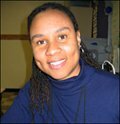By 2 o’clock in the afternoon on a chilly day last week, Augusta Bryant, a first-year teacher at William T. Sherman School here, had lost more than 30 minutes of class time to a fire drill and watched four of her science-lesson goldfish expire in their bowl.
It didn’t rattle her. As one of the 30 teachers who had signed on to turn around a school where student performance has lagged for so long that local education officials called it the first in the district to be blasted with the full force of the No Child Left Behind Act, Ms. Bryant was made of sterner stuff.
Still, the young teacher in the modish squared-off glasses, the product of an innovative training program, knew she had a lot to learn—and a real chance to learn it. So when she sat down with her coach, her mind snapped to attention.

Listen to an interview with Augusta Bryant, a teacher at the William T. Sherman School in Chicago, and a graduate of the Academy for Urban School Leadership’s teacher preparation program. The 5-year-old nonprofit academy sends its graduates solely to low-performing schools in the Chicago district.
“I’m worried,” she confessed without preamble or embarrassment, “that I’m picking up some … bad habits in regard to assessment.”
She had asked her kindergartners to draw their favorite part of the story she had read them that morning, she said, and then hadn’t had time to ask them about the pictures. As a result, she had little more systematic knowledge of their comprehension than before the lesson.
The exchange that afternoon is a small part of the relationship between Sherman and a teacher- preparation pipeline known as the Academy for Urban School Leadership. And it provides a glimpse of how the academy might give a school named after the Union Army general a fighting chance.
Founded by venture capitalist Martin J. Koldyke, the 5-year-old nonprofit academy is independent of the 426,000-student Chicago system, but sends its graduates solely to low-performing schools in the district. The Sherman School represents the academy’s biggest challenge to date and tests its core idea that teachers, above all, make for school success.
In all, the academy operates five public schools here in the district—three where the prospective teachers spend yearlong “residencies” under the guidance of accomplished veterans, and the fourth combining the populations of two low-performing schools in a new building. But unlike the others, Sherman was not a new entity and never closed down.
Five-Year Commitment
In the South Side neighborhood of Englewood, where virtually every block has a weedy lot and a boarded-up house, like rotten teeth in a grim smile, the school has struggled for at least two decades. In the 1990s, a Sherman student killed himself playing with a gun in class, and another was beaten up just outside the school by his classmates. Year after year, for at least the past decade, about three out of four students did not reach standards on national and state tests.
More than 180 other Chicago schools have underperformed for so long that they, too, are subject to the federal education law’s most drastic remedies. Yet district officials decided last winter that only Sherman would get the maximum makeover—new staff members under a private operator.

“The children stay, and the adults leave,” explained Donald Feinstein, the executive director of the academy. And there would be less than seven months to assemble the staff. Otherwise, the 650 students and their families—100 percent African-American, virtually all eligible for subsidized lunches—would have had to face the upheaval of a new school this September.
In vying for the job of operating the “turnaround” school, the academy pointed to its graduates as a ready-made pool of teachers with exceptional preparation and support. They had been “residents” in Chicago classrooms for a year, earning a master’s degree on the side. All had agreed to work in the district for five years in exchange for a $30,000 stipend and tuition.
“We said one reason you should give us the school is we will bring in quality teachers and meet the mandate for that under NCLB,” Mr. Feinstein recalled. At the same time, in his thinking, the academy would benefit from a close connection with the school. With 38 in this year’s class, placements were getting harder. Not every low-performing school was a good fit for the graduates, who had been encouraged to individualize student work, cultivate higher-order thinking as well as basic skills, and collaborate with one another.
Experts see a host of advantages for a school that can hook up to a pipeline like the one the academy provides. “It would seem that this school has hired teachers who already have a lot of the knowledge and a lot of the experience you need to be successful,” said Dan Challener, the head of the Public Education Foundation in Hamilton County, Tenn. And because the teachers have been trained along the same lines, “they’ll reach a culture and a set of high standards, I would imagine, much more quickly than other schools.”
With contract in hand, Mr. Feinstein and Madeleine Maraldi, the academy’s director of new schools and teacher development, both former principals, set out first to find the right principal, fast. Collecting recommendations from principal-training programs and Chicago district leaders, they began talking to some 40 potential candidates.
After giving him two rounds of possible scenarios to sort out, they settled enthusiastically on Lionel A. Allen Jr., a graduate of the Chicago public schools and Northwestern University in nearby Evanston, Ill., who had served less than a year as an assistant principal at another Chicago K-8 school. He had taught American and African-American history for six years in a well-heeled suburban high school and is young enough to decline to give his age.
“He excels at teamwork,” Ms. Maraldi said of the former college basketball player, who wears his authority—and checks his ever-present BlackBerry-unobtrusively.
School From Scratch
Mr. Allen had never heard of the academy when the job opened, but he knew that as a teacher he “was tired of watching decisions not made in the interests of children.”
Starting in February, he took charge of creating a school from scratch on the same per-pupil budget as other district schools, using basic ideas from the academy and adding some of his own. Along with a high-quality staff, the academy had promised after-school programs, meaningful evaluation of teachers, and an improved physical plant—all of which have begun to materialize.

But hiring took first priority. Mr. Allen and Ms. Maraldi observed almost all the teacher candidates in their classrooms. They sent out letters to some 400 teachers who held advanced national certification in their fields or were winners of the Chicago-area teaching award known as the Golden Apple, inviting them to apply and reap a district-financed $10,000 bonus for each of three years if selected. And they examined the ranks of academy graduates, deciding to hire no more than four first-years for a teaching staff of 30.
Mr. Allen, who recalls students screaming out the windows and tossing rulers during one of his visits to Sherman before it closed in June, described the job to teachers in stark terms. “This is a very tough school to walk into,” he said. “This community has been sick for years with social problems.”
In the end, 13 teachers who had been prepared by the academy were hired, most with two years of experience. Five teachers certified by the National Board for Professional Teaching Standards came on board, and two winners of Golden Apples. Three-quarters of the teachers have master’s degrees; more than half are black.
Mr. Allen also insisted on a full-time social worker and two assistant principals who had deep knowledge of elementary curriculum and assessment. The assistant director of graduate support for the academy, Rebecca Hendrickson, was also housed at Sherman, where she works with all the academy graduates and the few other rookies as well. Finally, Mr. Allen brought on a cadre of African-American men, younger versions of himself, as aides.
“It’s a dynamite staff,” the principal offered.
In July, the newly hired educators got together at academy expense for five half-day weeks of planning. A highlight of that time was a parade of all the staff through the neighborhood, with the only employee left from the old days, a security guard, knocking on doors to introduce the educators to residents.
‘Not Easy, But Possible’
More than seven weeks into the school year, the hard work is under way—along with 8th graders chanting Maya Angelou call-and-response style in the hallway and kindergartners observing fish at their pint-size tables.

Listen to an interview with Nicole Howard, a teacher at the William T. Sherman School in Chicago. Twelve years ago, she quit her corporate job to take up teaching, and showed such skill she became part of the academy’s first training school.
In Room 302 on the third floor of one of Sherman’s two newly spruced-up buildings, Nicole Howard says of her 7th graders: “If I get them to grow a year and a half by the end of the year, I’ll feel like I’ve done my job.”
Twelve years ago, she quit her job as a data analyst to take up teaching, and showed such skill she became part of the academy’s first training school.
She liked it there, but it strengthened her resolve to switch to Sherman when she heard another teacher remark that no turnaround would work at the school. “It’s the same kids,” the other teacher scoffed.
“If you manage time and target the right skills, it can be done,” Ms. Howard said. “I’m not saying it’s easy, but it’s possible.”
Back at the coaching session, Ms. Bryant, the first-year, was getting the same idea from her coach, Ms. Hendrickson.
“A couple of things come to mind,” the academy employee said after listening to Ms. Bryant. Rather than be dependent on infrequent formal tests to gauge what work each student most needs, she suggested, how about pulling a piece of work from each child, perhaps of the same type, over several weeks? “Several snapshots over time will really help,” Ms. Hendrickson urged.
“That makes me happy,” the kindergarten teacher sighed. “I don’t have time to write, write, write when they are still so needy. … That sounds manageable.”





